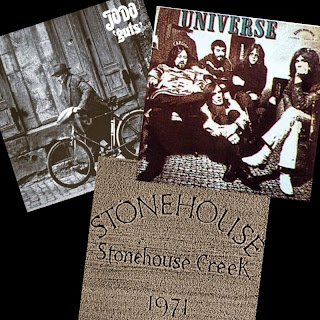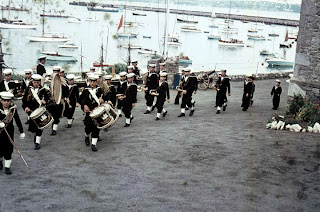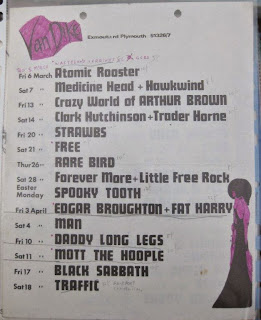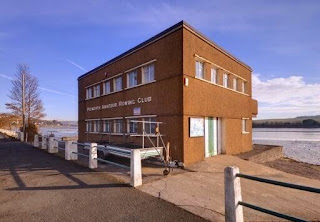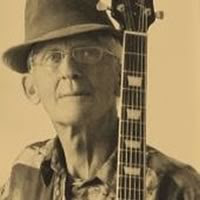Download from [mf] or [mg]
pass: tdats
Before going further, two invaluable sources that I must thank for making searches in all things nederbeat easier are Alex Gitlin's Nederpop Enyclopedia and Erik Hessel's nederbeat.info.
Panda Discography
No Coockies / Swingin' About
Philips 6075 130
Philips 6075 130
Panda's first single, a-side No Coockies is a heavy flute-tinged progressive instrumental with great guitar and a poignant central motif. B-side Swingin' About starts with a lumbering, off-center groove which makes it sound mean and nasty, Rob Kruisman's added flute and sax combines to make this a unique track that's genuinely heavy and doesn't sound quite like anything else I can think of.
1971
Stranger / Medicine Man
Decca 6100013
Stranger begins deceptively, with a heavy Sabbathian tri-tone metal riff, but quickly morphs into a Slade-elic glam stomper with a sing-along chorus and more flashes of flute, great fun. B-side Medicine Man is built around a similarly heavy, lumpen riff to "Swingin' About", this time with no flute and forays into blues, it's another of their best heavy tracks.
Stranger begins deceptively, with a heavy Sabbathian tri-tone metal riff, but quickly morphs into a Slade-elic glam stomper with a sing-along chorus and more flashes of flute, great fun. B-side Medicine Man is built around a similarly heavy, lumpen riff to "Swingin' About", this time with no flute and forays into blues, it's another of their best heavy tracks.
1972
Living for Tomorrow / Blue Boy Blues
Philips 6012182
Living For Tomorrow shows another side of Panda. The lilting melody and affirming lyrics on casting away the past to look to the future makes for a perfect pop song, it would've been a hit for a famous band. B-side Blue Boy Blues returns to the bluesy glam of Stranger, with a hint of country rock. Jaap van Eik's imaginative bass-lines and Rob ten Bokum's catchy licks make for a final addictive track to end their career, albeit far too soon.
Jaap van Eik and Panda
Jaap was born in The Hague, in the western part of The Netherlands. At around the age of three his family moved to Venezuela, so along he went. When he was eleven he suffered appendicitis, for his own sake his parents decided to send him back to the old country to recover, and to get a better educational grounding. He started playing the guitar at fourteen, but switched to bass three years later; "because in those days there were always too many guitarists!". He would however return to the guitar in some bands later on, such as Trace. When asked about early inspirations, he had this to say; "As everybody in the sixties I was hugely influenced by The Ventures and The Shadows. Later it was The Beatles, The Rolling Stones, Jimi Hendrix, Cream, Deep Purple, Led Zeppelin, Stevie Wonder, Little Feat and Allman Brothers, to name a few. My personal favourite was Jack Bruce, would you believe it. Also guitar players like Jeff Beck and Eric Clapton."
While studying graphic design in Arnhem, Japp met pianist and fellow student, Herman Brood. Herman is a famous character in Dutch rock, who became an artist later on (wiki). Sadly he committed suicide in 2001, after years of health problems resulting from life-long heavy drug use. At this point Jaap had already played in a Shadows covers band, with Herman and some other local guys he formed a band and started hanging out in small clubs. They were The Moans, later just "Moan". Soon they were playing further afield; "We mainly played around the city of Arnhem. When a serious fight broke out during a gig and the police had to intervene, we were expelled for a while and started to play in Germany (Arnhem is located close to the border). We played in Germany quite often, where we met loads of English bands and musicians. They were like gods to us!".
From the late ‘60s into the ‘70s, Jaap became an in-demand bass player. In his own words, he had a "tendency to use the bass as a solo instrument", which goes some way in describing his personal style. He spent time in many bands, including Cuby + Blizzards, Blues Dimension, The Motions and Solution. He also played on the Jan Akkerman solo LP, “Profile”. He regards the most defining moment in his career as his time with blues rockers Cuby + Blizzards. Herman Brood had already joined, and recommended Jaap. This is where he and Herman first made names for themselves. Jaap remembers: “This was a whole new step up. They were quite famous then and played many gigs, made a few albums and toured a lot in Germany and other European countries. As a matter of fact we even went to England, where we met people like John Mayall (we did a tour with him and his band in The Netherlands afterwards) and Alexis Korner.” Jaap left Cuby in 1969 and switched around various bands and styles in the ’70s. "Blues Dimension was brief, Solution was great, we toured the UK extensively in the seventies, and I was foolish enough to turn down an offer from Jan Akkerman to join Focus! Trace was the last band I played in. That was a nice period although things became rather complicated then.”
Interview with Jaap
Me: Hi Jaap! How and where did the members of Panda meet, was it in Alkmaar? Why was the name ‘Panda' chosen?
Jaap: No, it wasn’t in Alkmaar. I once saw a young drummer who impressed me. His name was Herman van Boeyen. So when we needed someone for Blues Dimension, I suggested him. We kept in touch after that and at one point we decided to start a new band together. I lived in a place called Zwolle, he was located in Amsterdam. The name Panda was chosen because Panda was a popular figure in a comic strip, about a small panda bear.
 |
| Originally a Dutch strip written by Marten Toonder, it was also published in German translations, as seen here. |
Me: Is this the correct line-up for all three singles?
Ben de Bruin (guitar)
Emile den Tex (vocals)
Herman van Boeyen (drums)
Jaap van Eik (bass)
Rob Kruisman (wind)
Jaap: No, Here's how it was. The original band was started by myself and drummer Herman van Boeyen. Only the first line-up was with Emile den Tex (vocals) and Ben de Bruin (guitar). Emile didn’t stay very long and was replaced by Rob Kruisman (Ekseption, Brainbox and Modesty Blaise etc.) for vocals, saxophone and flute. When Ben de Bruin left, we added Rob ten Bokum (Modesty Blaise) who played guitar and also flute.
So the final stable lineup was myself (bass), Herman van Boeyen (drums), Rob ten Bokum (guitar, flute) and Rob Kruisman on vocals, saxophone and flute.
 |
| (l-r) Rob Kruisman, Jaap van Eik, Rob ten Bokum, Herman van Boeijen |
Me: Can you describe when and where you recorded the three 45s that Panda released? Do you have any favourite Panda songs? Can you remember anything about recording them?
Jaap: I’m not quite sure who plays on which track. No Cookies was definitely with Rob and Rob, the b-side and Medicine Man were with Emile, Stranger was with Rob Kruisman and Ben de Bruin, Blue Boy Blues again was with the two Robs. I’m not entirely sure, to be honest, so I’d have to listen to the recordings.
As far as I can remember the recordings are from different sessions. Most of them were done in the Phonogram Studio in Hilversum, No Cookies was definitely recorded in The Hague with Jaap Eggermont (ex-drummer of Golden Earring - producer of Cobra seen in Vol111) producing. The other songs were produced by Tony Vos (Cuby + Blizzards, Blues Dimension) or Hans van Hemert (Q65, Inca Bullet Joe). I particularly remember the sessions for No Cookies, which in my opinion is our best track. I was a fan of Chris Squire’s bass sound [Yes], although he played a Rickenbacker and I played a Precision Bass. So Jaap Eggermont suggested I use a small amplifier turned up all the way plus a direct line to the mixing board. The sound was great.
As far as I can remember the recordings are from different sessions. Most of them were done in the Phonogram Studio in Hilversum, No Cookies was definitely recorded in The Hague with Jaap Eggermont (ex-drummer of Golden Earring - producer of Cobra seen in Vol111) producing. The other songs were produced by Tony Vos (Cuby + Blizzards, Blues Dimension) or Hans van Hemert (Q65, Inca Bullet Joe). I particularly remember the sessions for No Cookies, which in my opinion is our best track. I was a fan of Chris Squire’s bass sound [Yes], although he played a Rickenbacker and I played a Precision Bass. So Jaap Eggermont suggested I use a small amplifier turned up all the way plus a direct line to the mixing board. The sound was great.
Me: What was the song-writing process of the band? And who was the creative leader of the band, if there was one?
Jaap: There wasn’t a real creative leader, which was one of the problems we had. Herman van Boeyen was a strong personality with many ideas, especially when it came down to riffs, I always fiddled with sliding sounds and melodies, but most of the actual writing came from Rob Kruisman and Rob ten Bokum. That is, in the line-up with them. Also there was a lot of improvisation.
Me: Panda's music is fantastic, all the members’ performances gel brilliantly. It’s generally got an anthemic sing-along melodic style, and heavy rockers like 'Swingin' About' and 'Medicine Man'. Can you explain your thoughts on the band’s versatility and what influenced the sound of Panda? To me, Panda has more of a 'hard rock' sound than bands you and the other members were in previously. Was this a sound that Panda was particularly aiming for?
Jaap: I’m rather surprised that you know the music at all, let alone that you like it so much. It was a great little band that never sounded the same on any gig. Also we were accomplished players, and as I said before, much inclined to improvise. Our sound was obviously influenced by bands that were popular at the time. Led Zeppelin for instance, but also an American band like Moby Grape. We wanted a lot of power, we were loud and aggressive and we played long solos!
Me: There is some great wind instrumentation like flute and clarinet (I think) on the songs 'Swingin' About', 'Living For Tomorrow' and 'No Coockies'. Can you remember who wrote and played these parts?
Jaap: It’s a flute. The parts were played by Rob Kruisman. I think the melody line in No Cookies was written by Rob ten Bokum.
Me: What equipment, bass and playing techniques did you use?
Jaap: I used a Fender Precision Bass with a 100 Watt Marshall Bass stack. I never played with a pick, but sometimes used a technique I learned in the classical guitar lessons I had when I was sixteen: instead of the fingertips of my right hand I would pluck the strings with my fingernails.
Me: Did Panda ever play live? Do you have any memories of such that you could share?
Jaap: Oh yeah, we did many gigs in The Netherlands, Germany and even France. I’d have to think about the memories, it’s a long time ago.
As a rule Dutch bands tend to play a lot in Germany as that country is literally next door. With Panda we mainly played in what is called the 'Ruhr Gebiet': the area between city's like Düsseldorf, Krefeld, Essen and Duisburg. At the time there were many clubs around. About France, I happen to remember we played once or twice in the northern part of the country and traveled to Germany from there. In all the years I've been playing I met quite a few English bands on the road - Pretty Things, Hollies, The (New) Searchers, Renaissance - and also guys from Holland. Golden Earring for instance.
We once performed a gig on a balcony of a beautiful villa in the town of Arnhem [Netherlands]. It's located in a park called Sonsbeek. The particular occasion was a free festival with bands, but also other types or artists. I remember it was a lovely day then and a great surprise that I met my mother! She hated me 'wasting my time with bands', but was nevertheless there.
 |
| Sonsbeek Villa roof, free festival in Arnhem Herman van Boeijen (drums) - Rob ten Bokum (guitar) Jaap van Eik (bass) - Rob Kruisman (flute) |
Me: Do you know if any Panda singles had success in the charts or TV shows?
Jaap: The only recording that was heavily played on the radio was No Cookies. It looked like it was going to be a hit, but unfortunately that never happened. But we did appear in TV-shows.
Me: Do you remember which TV shows you appeared on?
Jaap: In Holland we had something called the tip parade. So what happened is they selected a single and played it every hour. Usually that particular song became a hit and sold well. In our case that unfortunately did not happen. There were many pop shows on TV in those days, but I can't really remember the exact names. They were all play-back, so rather frustrating [meaning they were mimed to a backing-track]. Also we had a couple of pirate radio stations on ships, that were very popular: Radio Veronica and Radio Noordzee.
[I had not heard of the "tipparade" before, and found it hard to get a good definition, so I asked fellow tdats fb group admin (and Dutchman) Mark, and he explained: "The tipparade back then was a list of singles that had a big chance of entering the charts, the Veronica Top 40. It was broadcast on the famous Radio Veronica. I think the name is still used today though of course with downloading etc. it's very different from how it went back then. they changed it from 20 singles to 30 in 1970, so around the time Panda was active it was 30 singles. The list was printed and you could get it at your local record store. The number one on the Tipparade is called "Alarmschijf" This was the track that was played every hour on Radio Veronica."]
Me: How and why did the band end?
Jaap: I’m not sure! I think there was no progression anymore, it was hard to survive and also, Herman van Boeyen and I had an offer from Livin’ Blues, a highly popular Dutch band with a busy schedule. So we joined them for a while.
Me: Was Panda ever intended to be anything more than a singles band? Do you think you had the potential to last longer, be more successful and more well-known?
Jaap: You know, back then you mostly had to prove yourself. First you made a single. If that was a success, you made another one. If that one was also well received, the record company would start thinking of an album. Of course there were exceptions, but as a rule that was how things went. Had No Cookies been a hit, the band might have stayed together and who knows what would’ve happened then. We certainly had the potential.
Me: I've been told that it was particularly hard for rock bands to get backing from Dutch labels to record a whole album back then, and they were often encouraged to focus on writing radio-friendly pop singles, in search of a 'hit'. Because of this, many bands with great hard-rock potential like Panda made a string of singles which may have been more commercially-oriented than they would have liked, and unfortunately made no albums. What are your thoughts on the accuracy of this viewpoint? Did any of these issues affect Panda?
Jaap: I think I just answered this question. What you state is absolutely true. When you went to a record company with a string of songs, the usual reaction was: "quite nice, but I don’t hear a hit". Every Dutch musician from the period has learned to hate that attitude.
 |
| Pierre van der Linden, Jaap, Rick van der Linden Trace c.1974 |
Jaap: My involvement with Trace is quite a long story. I didn’t prefer the symphonic style to hard rock, although it was indeed rather challenging to play. Also I thought it was a great opportunity to form a trio with fantastic musicians like Rick van der Linden and Pierre van der Linden (not related by the way). In this case we had full support from the record company and could make an album right away. We had a great time, toured a lot (mainly in Germany, Scandinavia and the UK) and switched drummers just before recording the second album. Pierre went back to Focus, we replaced him with Ian Mosley [later of Marillion], who was a great drummer and also a great guy.
Me: What else have you done since Panda, in music or otherwise, and what are you doing now? Tell us about your decision to become a journalist, and appointment as editor of Music Maker.
Jaap: Briefly, since Panda I played in many bands: Livin’ Blues, Solution, Trace for instance. Around 1976 I got a strong feeling that I’d reached a dead end and could only repeat what I’d been doing before. Also, the economic circumstances were worrying me. In the Dutch music scene we have a saying: ‘what you primarily need to be a rock musician is a girlfriend with a good job’. I was fortunate enough to have that girl friend with a good job (she was a fashion model) and did enjoy some success, but nevertheless it was getting me nowhere. I’ve always been interested in writing and journalism, so when a publishing company offered me a job as an editor I gladly accepted - with the idea of playing in a band in my free-time. When I became editor of Music Maker Magazine, I didn’t have the time anymore and also discovered that as far as playing was concerned, it was all or nothing for me. So I had to decide between music and journalism. I never regretted choosing journalism. I had a great job until 2001, when I became a freelance-writer.
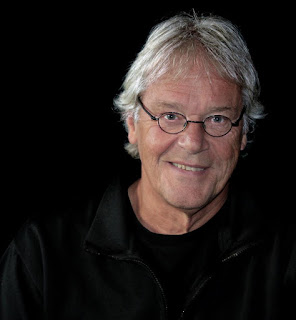 |
| Jaap in recent times |
Jaap: It was a tight very little band, especially after changing the line-up with Rob Kruisman and Rob Ten Bokum. The latter was a good songwriter and guitarist, the former quite a showman and apart from being the singer, also a good saxophone and flute player. Our repertoire was a mix of original material and covers. I remember we included explosive versions or The Beatles' I Wanna Hold Your Hand' and a few Stones songs. We mainly played small clubs around The Netherlands, were usually quite well received, but for some reason never got very far. Being on stage was always great fun, as we didn't rehearse that much and mainly relied on our improvisational skills. This meant that songs could go on forever if we were on the right track.
We liked to party, which sometimes annoyed our drummer Herman van Boeyen, who at one time tried to enforce a no-alcohol rule during gigs - obviously the others didn't comply. Apart from being a good drummer Herman was a funny guy. He never liked being dependent on other people and one day decided he also wanted to be a singer. The problem was, his voice wasn't that strong. So we said to him: 'Herman, that won't work, your singing is just no good'. 'Oh, I can learn that', he insisted. 'No Herman, no way', we grinned. Then Rob Kruisman said jokingly: 'You know what you should do? Gargle with whiskey, that'll do the trick'. Five minutes later he was gargling whiskey! We laughed our heads off, but a couple of years later, in another band called Vitesse, Herman proved his point: he became the drumming singer and had a couple of hits!
There's a interview with Jaap that goes into much more detail about his life and career here at the DPRP (Dutch Progressive Rock Page) (link). A couple of years ago he wrote a book about Focus called "Focus: Wereldsucces, Ego's en Machtsstrijd".
© Richard Sheppard / aftersabbath.blogspot.com / Panda / Jaap van Eik
Share via:
There's a interview with Jaap that goes into much more detail about his life and career here at the DPRP (Dutch Progressive Rock Page) (link). A couple of years ago he wrote a book about Focus called "Focus: Wereldsucces, Ego's en Machtsstrijd".
-------------------------
Thanks very much to Jaap, and I hope you enjoy Panda's brief but brilliant set of tunes as much as I do. If you haven't already seen it, check out a similar interview I did with Rob Vunderink about his old band, Cobra. Till next time, Rich.© Richard Sheppard / aftersabbath.blogspot.com / Panda / Jaap van Eik
TDATS social links
Share via:




